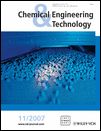Application of Amphiphilic Catalysts, Ultrasonication, and Nanoemulsions for Biodiesel Production Process
Abstract
This paper studies tuning heterogeneous transesterification catalysis and process for easy catalyst separation and enhanced reaction rate. Multibond metal alkoxides and ultrasonic pretreatment are employed to produce nanoemulsions with large interfacial area, which have the potential to be easily separated. With aluminum isopropoxide or titanium isopropoxide as the catalyst and surfactant, transparent alcohol/oil emulsions can be formed in less than four minutes and can significantly enhance the transesterification reaction rate. The micelle size was observed to be as low as 5.1 nm. Partially polymerized titanium isopropoxide also showed good catalytic activity and considerable amphiphilic properties in forming nanoemulsions. Viscosity and apparent vapor pressure reduction were also observed. The alcohol/soybean oil molar ratio was a main factor for apparent vapor pressure reduction.




